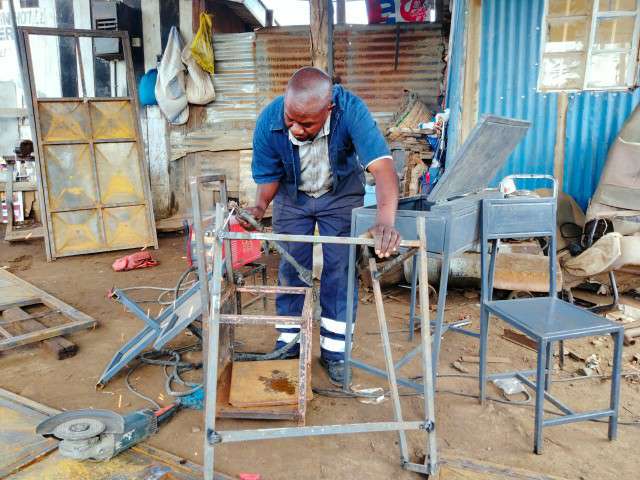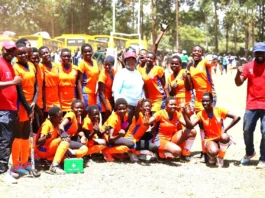In the bustling streets of Narok town along Nyawira Street, a remarkable transformation is taking place at a workshop where school furniture is being crafted with precision and dedication. Samuel Ocharo, the owner of this bustling yard, has found unprecedented success in the business of manufacturing school lockers and chairs. His decision to focus on metallic furniture has not only contributed to his financial fortune but is also aligned with the changing preferences in schools, favoring durability over traditional wooden alternatives.
Quick Summary
- Lucrative School Furniture Business: Samuel Ocharo, a Jua-Kali trader, has found immense success in the school furniture business, specifically in crafting metal lockers, desks, chairs, and tables.
- Shift to Metallic Furniture: Ocharo’s decision to opt for metallic furniture is driven by its durability, aligning with the changing trend in schools abandoning wood for more robust and long-lasting materials.
- High Demand and Profits: The surge in demand, especially during school opening seasons, has allowed Ocharo to make substantial profits, reaching millions of shillings. The popularity of his furniture is attributed to its quality and comfort, earning him credibility among customers.
Embracing Change for Success
Samuel Ocharo’s success story is rooted in his ability to adapt to evolving trends in the education sector. The preference for metallic furniture, driven by its durability, has positioned Ocharo as a leading supplier in Narok town. With schools increasingly opting for metal over wood, Ocharo’s decision to invest in this shift has proven to be lucrative.
Ocharo attributes the high demand for his products to the implementation of the Competency Based Curriculum (CBC), leading to the establishment of Junior Secondary Schools. These new schools have created a substantial demand for lockers and chairs, propelling Ocharo’s business to new heights.
Quality and Cost Efficiency
Despite the slightly higher initial cost of metallic furniture compared to wooden alternatives, Ocharo emphasizes the long-term cost efficiency. The durability of metal lockers and chairs significantly reduces maintenance and repair costs, making them a preferred choice for schools looking to invest in sustainable and cost-effective furniture.
The success of Ocharo’s venture has enabled him to hire additional employees on both a contractual and casual basis to meet the escalating demand. He encourages fellow Jua Kali traders to embrace the trend of producing metal school furniture, not only for financial gain but also to contribute to environmental conservation through the use of long-lasting materials.
Final Thoughts
Samuel Ocharo’s journey in the Jua-Kali sector serves as an inspiration for entrepreneurs seeking success in niche markets. His strategic shift towards producing metallic school furniture has not only met the demands of the evolving education landscape but has also brought prosperity to his business. As schools continue to embrace changes in curriculum and infrastructure, Ocharo’s story highlights the importance of adaptability and innovation in the pursuit of entrepreneurial success. May his success encourage others to explore unconventional paths in the world of business, creating a ripple effect of positive transformation in various industries.




